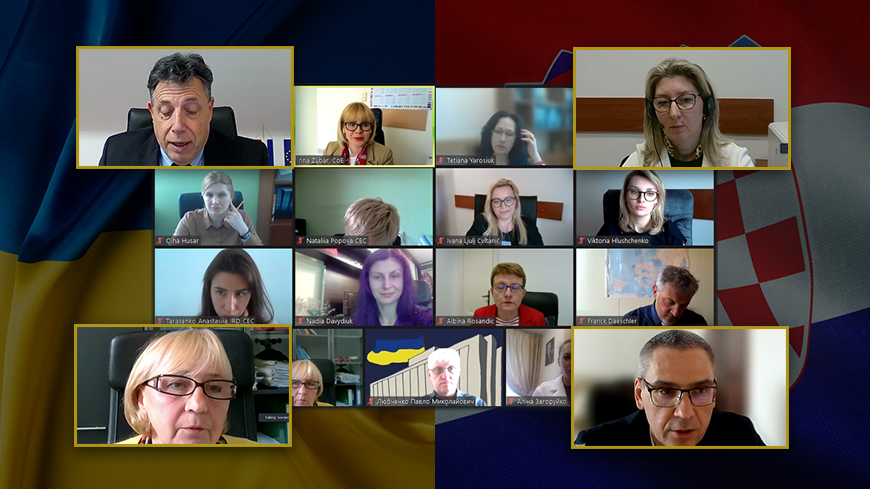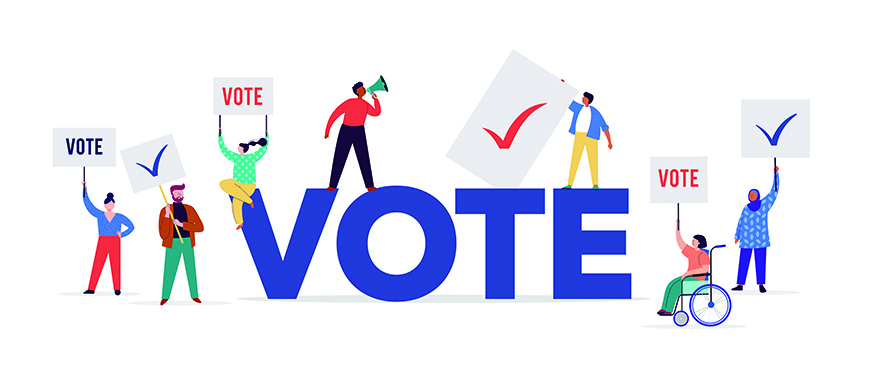In April-May 2023, over 60 representatives of the Ukrainian Parliamentary Committee on State Power, Local Self-Government, Regional and Urban Development, the Central Election Commission (CEC) of Ukraine, as well as current and former representatives of the State Electoral Commission (SEC) of the Republic of Croatia took part in the series of online exchanges to discuss challenges and related aspects for organisation of first post-war elections, as well as elections in times of crisis.
These meetings with Croatian representatives follow the series of exchanges with representatives of the CEC of Bosnia and Herzegovina, which took place between February and April 2023, thus continuing the exchanges between representatives of the Ukrainian authorities and representatives of election management bodies from countries that had experience of holding elections in a post-conflict/post-war period*.
H.E. Ambassador of Croatia to Ukraine Anica DJAMIĆ welcomed the participants and encouraged these exchanges on such a crucial democratic issue as elections, and expressed her gratitude to the President of the Supreme Court of the Republic of Croatia and President of the State Electoral Commission of the Republic of Croatia ex officio Radovan DOBRONIĆ, for his readiness to share the Croatian experience and lessons learnt from their first post-war elections, in order to support Ukraine in its efforts to prepare for organisation and conduct of elections in post-war period.
During these meetings, the Ukrainian and Croatian representatives discussed the following issues:
- evolution of the SEC Croatia from an ad hoc institution to a permanent institution,
- jurisdiction for appointment of election commissions and polling station committees,
- legal framework for organisation and conduct of elections in 1997,
- political context in the Republic of Croatia back in 1997,
- elections security,
- terms for appointment and holding of post-war elections,
- system and role of EMBs, appointment criteria, complex post-war conditions,
- administration of elections,
- election complaints and election dispute resolution,
- voter’s lists and voters’ registration from 1997 to the present day,
- eligibility criteria for active and passive suffrage set in the current electoral legislation of the Republic of Croatia.
Respective experience was presented by current and former representatives of State Electoral Commission, as well as Ministry of Justice and Administration of the Republic of Croatia.
Furthermore, the Croatian representatives shared their experience about the organisation and conduct of elections in times of crisis or natural disasters, as such as in the aftermath of an earthquake or water-flood, that cause issues similar to post-war period (e.g. damaged or destroyed infrastructure, important number of internally displaced persons and refugees, etc).
Olena SHULIAK, Chairperson of the Ukrainian Parliamentary Committee on State Building, Local Governance, Regional and Urban Development, and Oleg DIDENKO, Chairperson of the Central Election Commission of Ukraine in their statements specifically underlined the usefulness and importance of such peer-to-peer online exchanges on post-war elections and expressed the hope for further offline meetings and discussions in the nearest future.
Upon the results of these meetings, an analytical overview “Organisation and conduct of first post-war elections. Experience of the Republic of Croatia and lessons learned for Ukraine” will be produced, presented to, and shared with, other national stakeholders concerned and broader public for further thematic discussions and consultations.
Moreover, the series of conducted meetings with representatives of Bosnia and Herzegovina and the Republic of Croatia is planned to be concluded with a trilateral exchange during a visit of Ukrainian delegation to Bosnia and Herzegovina.
*Series of meetings are organized upon the request of Ukrainian partners and as follow-up to the High-level dialogue on “Good democratic governance in Ukraine: achievements, challenges and the way forward in post-war period” held in Strasbourg, France, on 8 – 9 November 2022, within the framework and with the support of the Council of Europe project "Supporting democratic post-war elections in Ukraine", implemented within the framework of the Council of Europe Action Plan for Ukraine "Resilience, Recovery and Reconstruction" for 2023-2026.





